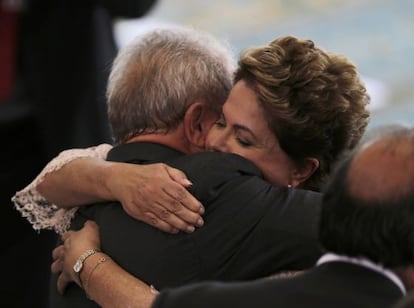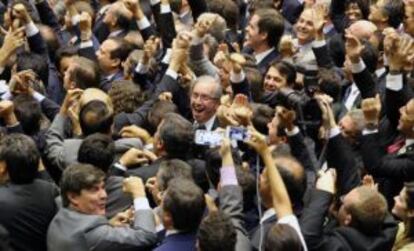Rousseff seeks Lula’s help with crisis
Unofficial meeting between current and ex-Brazilian leaders fuels speculation in the media


Brazilian President Dilma Rousseff traveled from Brasilia to São Paulo on Thursday. There were two purposes to the trip: a routine medical checkup, and a meeting with her political mentor, former president Luiz Inácio Lula da Silva.
The get-together has triggered a wave of differing interpretations as to its ultimate purpose, as well as much political commentary. The personal and political relationship between Rousseff and Lula – who still exercises a notable influence on Brazilian society and on the Workers’ Party – is always the subject of detailed analysis by the national media.
Neither the exact location of the meeting nor its motive, duration or topics of conversation have been officially disclosed. But the prevailing hypothesis is that Rousseff went to see her mentor to seek support and advice on how to handle some of the multiple crises that herald a difficult presidency for her this time around.
There is one unquestionable fact: this is the first time that the two have met alone and with time to spare since Rousseff took office for the second time at the beginning of the year. And the fact that the meeting was shrouded in the utmost secrecy (it was not on the presidential agenda) only increased media interest.
The president is doing battle on several fronts. The first and most evident is the economic crisis that the country can’t seem to shake. Figures released on Thursday by the Central Bank of Brazil show that the economy shrank 0.15 percent in 2014. And the report adds that the nation will toy with recession throughout this year as well.
It doesn’t help that the government is announcing budget cuts to balance the national accounts. Nor is it good news that the drought in the state of São Paulo, home to 44 million people, could lead to water and electricity restrictions.
Rousseff badly needs to improve her popularity ratings, and this could be a reason for meeting with her mentor
But besides her economic woes, Rousseff is also facing a political labyrinth: the lower house recently elected a conservative speaker, Eduardo Cunha of the Brazilian Democratic Movement (PMDB), who is a self-declared opponent of the government. Cunha, the president’s political nemesis, has been maneuvering for weeks to place other hostile deputies in key congressional positions such as investigative or legislative committees.
And to top it all off, there is the Petrobras corruption scandal. The state-owned oil company is caught up in a bribes-for-contracts scheme whose inner workings are slowly emerging as a result of an ongoing investigation called Operation Lavajato (Carwash).
The inquiry has so far turned up evidence of fraudulent contracts worth millions, inflated invoices, cash-filled briefcases in Swiss banks and business leaders in cahoots with former Petrobras execs.
Last week, Rousseff fired the entire management team at the oil giant in a bid to stem the crisis at Latin America’s largest public corporation. But murky new details are likely to keep emerging for months to come as the probe progresses.

As a result, Rousseff’s own popularity is plummeting. A poll published on Sunday by A Folha de São Paulo found that the president’s popularity rates had dropped from 42 percent to 24 percent in just three months. This represents her worst results since first taking office in 2011, and is also the lowest grade a Brazilian president has scored since the days of the Social-Democrat Fernando Henrique Cardoso in 1999.
Rousseff badly needs to improve her ratings, and this could be a reason for her appointment with her mentor, who was president between 2003 and 2011. Lula may be asked to get out and campaign in the streets, where his galvanizing speeches still have the power to rally people around the flag of the Workers’ Party like nobody else’s can. Or he may be asked for help clearing up the congressional gridlock thanks to his influence and diplomatic skills.
After all, Lula has not lost his own popularity; he still preserves much of his international prestige; and is not at all averse to emerging as the national savior when the ship is sinking.
Tu suscripción se está usando en otro dispositivo
¿Quieres añadir otro usuario a tu suscripción?
Si continúas leyendo en este dispositivo, no se podrá leer en el otro.
FlechaTu suscripción se está usando en otro dispositivo y solo puedes acceder a EL PAÍS desde un dispositivo a la vez.
Si quieres compartir tu cuenta, cambia tu suscripción a la modalidad Premium, así podrás añadir otro usuario. Cada uno accederá con su propia cuenta de email, lo que os permitirá personalizar vuestra experiencia en EL PAÍS.
En el caso de no saber quién está usando tu cuenta, te recomendamos cambiar tu contraseña aquí.
Si decides continuar compartiendo tu cuenta, este mensaje se mostrará en tu dispositivo y en el de la otra persona que está usando tu cuenta de forma indefinida, afectando a tu experiencia de lectura. Puedes consultar aquí los términos y condiciones de la suscripción digital.








































